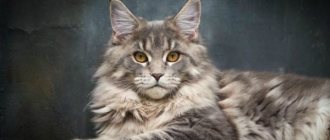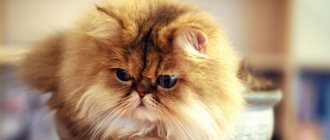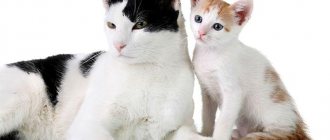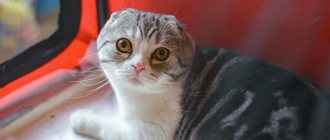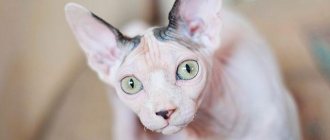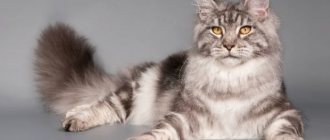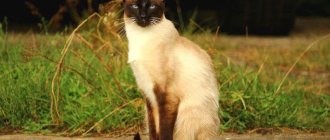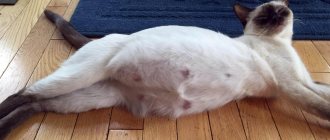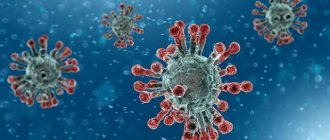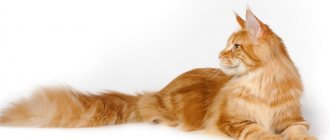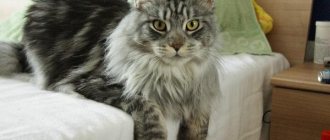In the photo there is a cat Pulcheria from the Yotunhem cattery (www.maine-coon.me)
There is an opinion that the life expectancy of Maine Coons is less than that of ordinary cats without a pedigree. Supporters of this point of view argue that maintaining the purity of the breed has a downside - the genotype is not updated, hereditary diseases are transmitted to an increasing number of animals, and as a result, the health status of a representative of a particular breed leaves much to be desired. The question of how long Maine Coons live is of concern to every fan of the breed who is thinking about purchasing a kitten. Most often, concerns about the life expectancy of Maine Coons arise among amateurs who visit breed forums on the Internet. On these pages, breeders share their experiences, talk about pet health problems, accidents, and unsuccessful births. A person just taking a closer look at the breed may get the impression that many Maine Coons are susceptible to diseases from childhood and, therefore, do not live long.
How long do Maine Coons live on average?
Representatives of the breed have an unusual exterior, but their size is especially impressive. Many people believe that big cats cannot live long.
The statement is not suitable for this breed. The average lifespan of a cat is 15-16 years, and a male cat is 12-15.
The formation of the pet's character and body is completed by the age of 6 years. Upon reaching this age, cats are castrated, because breeders no longer use them for breeding.
Castrates live as long as animals that have not undergone this procedure.
And finally
There can be no definitive answer to the question of how many years your Maine Coon will live and whether he will always be healthy. On average, Maines live 12-15 years, but in some individual cases the age limit can increase to eighteen years or more. Of course, the Manx breed has hereditary risk factors (like almost all animals), but this risk will be significantly lower if you purchase a kitten from trusted breeders. And with proper maintenance and your tireless care, your pet will delight you for many years to come.
Many examples of long-lived coons can be seen on the forum of owners of these wonderful animals:
Long-lived representatives of the breed
With proper care, a pet can live up to 20 years or even more.
In 2020, a Maine Coon cat living in the USA, Oregon, was included in the Guinness Book of Records. His age reached 26 years at that time. The owner developed a special diet for the animal. The cat is allowed to walk outside and hunt birds. His owner believes that properly selected food and walks allowed the pet to live for so long.
There is a cat in the UK who is about 31 years old. Owners do not register the record because they are afraid that their pet will not be able to endure the necessary procedures due to age.
Disease Prevention
Many diseases that occur in Maine Coons can be avoided if a number of measures are taken in advance:
- a balanced diet, including premium food, fresh meat, vitamins, minerals, and sufficient water;
- compliance with the vaccination schedule for cats, systematic antiparasitic treatment for preventive purposes;
- spacious living space, maintaining an active lifestyle;
- reduction of stressful situations, for Maine Coons this means a change of housing, owner;
- hygienic care of animals;
- systematic observation by a veterinarian.
Causes of early death
Cases of early death are typical for cats of this breed.
The main reasons for the phenomenon:
- Curiosity. The main character trait of Maine Coons is curiosity. They love to play with objects that come within their field of vision and access. Cats bite and swallow small things that cause choking. When playing with things, animals can injure their gums and develop an infection that can lead to death. When walking Maine Coons, owners should carefully monitor their pets, since they also play with small objects outside, and this is unsafe.
- Features of body structure. Maine Coons do not know how to balance on narrow surfaces. They do not land on their feet, like most cats. Owners need to provide a safe space in the apartment, that is, protect balconies, loggias and windows with special nets to prevent pets from falling.
- Feed quality. The lifespan of Maine Coons (like any other animal) is affected by their diet. Poor quality feed can lead to death because the digestive and excretory systems stop functioning normally.
- Hormonal drugs. It is not recommended to give your cat hormonal medications during the mating period - they can cause cancer of the reproductive system and lead to obesity.
How to care for your fur
Maine Coon coat care involves regular brushing.
Owners need to have two combs - one with sparse teeth, the other with frequent ones. To begin with, the cat is combed with a sparse comb. This is how you get rid of matted fur. After this, you need to use a fine-toothed comb. It is advisable to start the procedure from the head, moving towards the tail. It is advisable to do this frequently. This will prevent tangles from forming, which can only be removed by cutting. If there are a lot of such hairballs, you need to cut the animal with a clipper. If the owner is afraid of causing pain to the animal, it is better to contact specialized salons or a veterinarian.
The condition of the fur can be used to judge the health of the animal. If it is rare, has increased fat content or bald spots, you should take a close look at the condition of the coon. This can often happen with metabolic disorders. The condition of the coat is greatly influenced by the presence of a balanced diet; the cat must receive all the substances necessary for its body - minerals, vitamins. Vitamins B and E are especially important. Due to their deficiency, hair can actively fall out and lose its color.
Shedding
Maine Coons have three types of shedding:
- hormonal;
- seasonal;
- health related.
The first two types are a normal natural phenomenon. The average lifespan of a hair in a cat of this breed is approximately 25 days, after which the hair falls off and a new hair begins to grow in its place.
Seasonal molting occurs to regulate heat exchange. In nature, it occurs twice a year. Within a month, the cat sheds old and excess fur. The timing depends on temperature changes in the external environment.
For pets, these dates may shift. Dry air can cause increased shedding. This way the cat is saved from overheating its body. In some cases, wool and tangles can cause diaper rash to form on the skin.
If the animal is given enough attention, such phenomena do not occur. Shedding can also begin as a result of hormonal imbalances - the cat’s pregnancy, the period of milk feeding, or estrus. In such cases, the animal may become completely bald.
With the restoration of hormonal levels, the cat returns to its previous appearance. Molting can be a consequence of disease. If the owner notices that the cat has begun to lose its fur and there is no apparent reason for this, it is worth immediately going to the veterinary clinic for an examination.
Fighting tangles
You can bring your pet's fur yourself. Matted fur and tangles on it especially spoil the appearance of a cat. To deal with this you need:
- brush the animal regularly;
- purchase a webbing cutter;
- use brushes or a glove for combing;
- choose high-quality animal hair care products.
If you brush your coat regularly, tangles will not form. Not too large clumps of hair can be straightened out with a wide-tooth comb. In advanced cases, this problem can only be dealt with by cutting it off.
Age-related characteristics affecting life expectancy
Older Maine Coons are characterized by heart disease, problems with joints and the genitourinary system.
20% of cats suffer from underdeveloped hip joints, which often leads to fractures and dislocations. Veterinary medicine can correct this deficiency by performing an operation to replace this link.
Changes in the functioning of the joints can be caused by poor diet or obesity of the animal. Owners need to monitor their pet’s weight, as excess weight puts additional strain on the skeleton.
Among heart diseases, hypertrophic cardiomyopathy is the most widespread. External manifestations are invisible until the peak of the disease.
The main symptoms include paralysis of the hind limbs, shortness of breath, decreased activity, and bluish coloration of the mouth and inside of the ears.
If symptoms are detected, you should consult a doctor and undergo surgery. To prevent the disease, your pet needs to undergo regular ultrasound examinations.
Ultrasound examination will help to detect another common disease in time - nephrolithiasis. Kidney stones are formed due to poor nutrition, the correction of which will help avoid complications.
Nutrition - what and how to feed?
Proper feeding of Maine Coons is an important part of a cat’s healthy life. It is important to choose the right food and water containers for your pet.
It is necessary to take into account the fact that in the wild, the ancestors of cats, before drinking, try to clear the surface of the water from debris, fallen leaves, and twigs. At the same time, water is sprayed in different directions. Pets have retained this reflex. The Maine Coon may even knock over a bowl of water or move it along the floor. Therefore, the drinking container should be moderately heavy or fixed to the floor so that it does not move and cannot tip over.
The food bowl should be kept away from the water container. Otherwise, splashes that get into the food bowl can ruin the food. If the cat stays at home without its owners for a long time, it is better to purchase a water bottle. Water should always be fresh and clean.
Feeding Maine Coons has its own rules:
- You only need to feed your cat dry food of premium quality. It contains the necessary vitamins and various nutritional supplements that are important for the health and normal development of Maine Coons. Can be combined with canned food;
- if you feed with natural food, then the basis of the diet (at least 80%) should be meat and dairy products, vegetables and grains;
- If the cat's diet consists exclusively of natural products, it is necessary to regularly give vitamins;
- with a mixed diet, dry food should be the basis, and natural food should be additional.
What natural products can you feed your Maine Coon:
- meat: poultry, beef (raw and cooked), rabbit, lean lamb, chicken livers and hearts.
- vegetables: carrots, beets, cabbage, cucumbers, zucchini, pumpkin, tomatoes;
- hard cheese;
- eggs: yolk once or twice a week, boiled or raw;
- boiled sea fish, seaweed and other seafood;
- cereals, bran;
- fermented milk products: cottage cheese, yogurt, kefir, fermented baked milk (milk can only be given to kittens under 3 months of age);
- cereals: three to four times a week as an addition to boiled meat;
- sprouted grains: wheat and oats.
Important!
It is prohibited to add salt, sugar, or spices to cat food. It is strictly forbidden to give your pet beef and chicken bones, fatty pork, duck, goose, smoked meat products, sausages, sugar, potatoes, legumes, and chocolate.
Cats need to eat fresh greens periodically. To prevent your pet from being drawn to dusty, dirty grass during a walk, you need to sow grass seeds (wheat, oats) in a low, wide container (box) at home and allow the cat to eat the young sprouts.
If a cat is allergic to any of the food or products, the allergen should be removed from the diet.
Cat food should not be hot or cold. It should be at room temperature. Kittens need to grind their food. The kitten should eat at least 5 times a day. This principle must be maintained for up to 2 months. From six months onwards, the frequency of feedings is reduced to three times a day, and eight-month-old cats should be switched to two meals a day.
